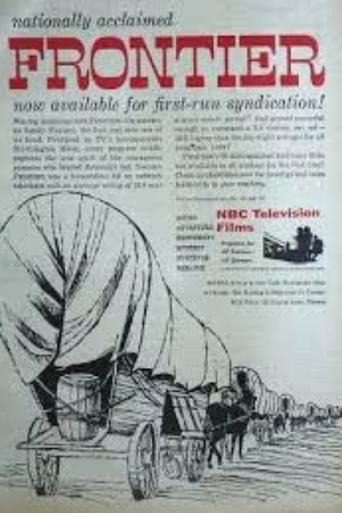

The film makes a home in your brain and the only cure is to see it again.
... View MoreAmazing worth wacthing. So good. Biased but well made with many good points.
... View MoreMostly, the movie is committed to the value of a good time.
... View MoreStory: It's very simple but honestly that is fine.
... View MoreThanks, Doug Brode, for the detailed update. I have an indelible impression from that long ago time-- Frontier was an unusual and outstanding series with offbeat stories and a memorably laconic tag-line. I tried to catch up with it every week until it suddenly disappeared. Unfortunately, Frontier came at a time when a hundred other much more predictable Westerns crowded the dial. Possibly, it got lost in the shuffle. Then too, there was no name "star" to carry the episodes from week to week. Instead, the series provided an opportunity for up-and-comers to show their stuff, as a reading of the cast list demonstrates. I wish I had something more detailed than a steadfast impression, but it's remained with me all these years, and I'm glad for the chance to share the experience-- something I never expected. Perhaps the Western Channel can revive Frontier, as they've done with that other short-lived, high-quality series, The Westerner. One can always hope.
... View MoreIn 1955, the golden age of live drama was quickly giving way to filmed series, mostly escapist fare, with the western dominating. Here was one of the few - and at best modestly successful - attempts to bridge the gap. Worthington Miner was a highly regarded producer who was known for the seriousness of his programs. It wasn't likely that he would do an ordinary western. And he didn't. Frontier was the second important anthology western series, with a continuing host ("The Old Ranger" on Death Valley Days) and a promise that each individual episode was at least inspired by something factual. Death Valley Days ran, of course, for more than a decade, with numerous other hosts taking over including, for a well-remembered two-year stint, Ronald Reagan. Frontier lasted only one season, and pretty much served as a foil to Death Valley Days, the latter stressing patriotic themes and upbeat endings. Not Frontier. Each week, the show opened and closed with a caravan of covered wagons heading off into the distance (Death Valley did, in fact, similarly begin with a single Boraxo wagon trudging along). Walter Coy (best remembered as John Wayne's doomed brother in the early sequences of The Searchers) would begin with, "This is the way it happened . . . movin' west" and then close with "That's the way it happened . . . movin' west." The shows were consistently downbeat. For instance: When they did the story of the Alamo, the focus was on the one deserter, not the heroes who died fighting. That episode was called "The Texians," and focused on the impact that the deserter has on a family when he stops at their isolated farm. In real life, the deserter's name was Rose, the family Zuber. No flag waving allowed on this series. Walter Coy not only narrated but showed up once in a while as star of individual episodes.
... View MoreI recall this series on BBC-TV in 1958-59. I have a very vague memory of this series content (with a few exceptions) but I vividly recall the opening music and scene. Covered wagons are moving into the distance. I saw it in monochrome, and I think someone must have been using a strong red filter, since the sky is very dark with brilliant white cirrus cloud - rather after the style of Ansell Adams. I recall one episode of a family attempting to cross Death Valley. I think this was an episode called The Big Dry. Another involved trappers who have a feud and involved knife fights where both of the combatants fight while biting at the ends of the same piece of cloth. I think this is the one called Out from Texas, although, I am certain it was originally called Out from Taos. But whatever it was called, it happened that way..... moving west.
... View More